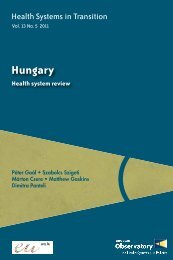Canada - World Health Organization Regional Office for Europe
Canada - World Health Organization Regional Office for Europe
Canada - World Health Organization Regional Office for Europe
You also want an ePaper? Increase the reach of your titles
YUMPU automatically turns print PDFs into web optimized ePapers that Google loves.
<strong>Health</strong> systems in transition <strong>Canada</strong> 55<br />
on medical errors, and critical incidents; however, the Canadian Patient Safety<br />
Institute has led a major initiative to produce guidelines <strong>for</strong> the disclosure of<br />
medical errors, with a revised version released in 2011 (CPSI, 2008, 2011),<br />
while other researchers associated with major health care agencies in <strong>Canada</strong><br />
have suggested disclosure guidelines in situations where a given error affects<br />
numerous patients (Chafe, Levinson & Sullivan, 2009).<br />
A number of provincial governments have issued general statements<br />
and booklets concerning the public health care benefits to which residents<br />
are entitled. These statements are generally available on ministry of health<br />
websites. Similarly, the federal government has used its departmental websites<br />
to provide in<strong>for</strong>mation on the health benefits provided to (<strong>for</strong> example) eligible<br />
First Nations, Inuit and veterans.<br />
2.9.2 Patient choice<br />
Within the limits imposed by geographical distance and isolation, provincial<br />
and territorial residents are at liberty to choose the physician, hospital or<br />
long-term care facility. Even residents living within a particular RHA can<br />
choose to access the services of a facility in another RHA in the same province.<br />
However, other than in an emergency, they cannot obtain insured medicare<br />
services in another province or country without a prior referral by an eligible<br />
authority in their own province.<br />
In the last 15 years, a patient’s choice of primary care provider has been<br />
constrained by the supply of family physicians in some locations as well as the<br />
desire by some physicians to limit their roster to potentially less demanding<br />
patients (Asanin & Wilson, 2008; Reid et al., 2009). Since family physicians act<br />
as gatekeepers in most provinces, patients are prevented or discouraged from<br />
approaching consulting physicians directly. However, at the point of referral,<br />
Canadians do have a choice of specialist.<br />
2.9.3 Patient rights<br />
Two royal commission reports, one in 1964 and a second in 2002, have<br />
recommended a pan-Canadian patient charter of rights (<strong>Canada</strong>, 1964;<br />
Romanow, 2002). Despite this, there is no national patient charter of rights in<br />
<strong>Canada</strong>. In addition, no province or territory has implemented a patient charter<br />
of rights or other laws defining specific individual patient rights (Smith, 2002).
















